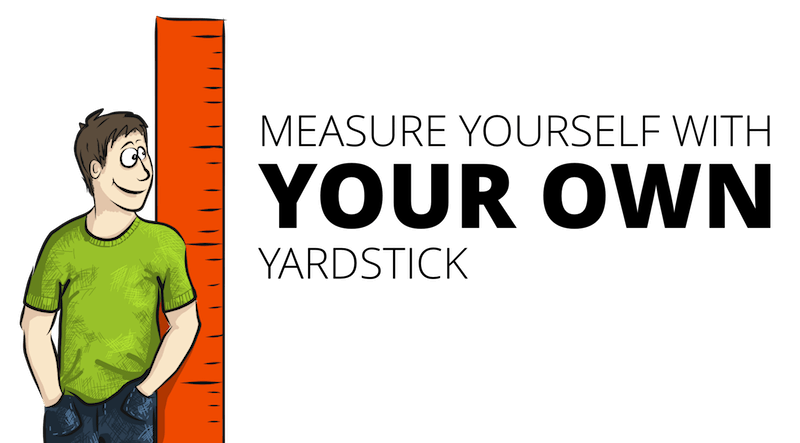Confessions Of An Impostor
Five years ago, when, for the first time ever, I was invited to speak at one of the best front-end conferences in Europe, I had quite a mixture of feelings. Obviously, I was incredibly proud and happy: I had never had a chance to do this before for a diverse audience of people with different skillsets. But the other feelings I had were quite destructive.
I sincerely could not understand how I could be interesting to anyone: Even though I had been working in front-end for many years by then, I was very silent in the community. I hadn’t contributed to popular frameworks or libraries. I was just average. So, the feeling of a mistake having been made, that I did not deserve to be at that conference, was very strong, and I could not believe that I would indeed be speaking until I had bought my plane ticket.
But a plane ticket won’t guarantee that you won’t collapse on stage from pressure, so things got even worse. The line-up of speakers was so fantastic that during the final weeks before the conference, and more so after meeting in person all of those famous people whose books and articles I had been learning from, the only thing I could think of was, “They are gonna find out. All of these great people will find out that I am here by mistake, because I know nothing. It will be the end of my career and the worst embarrassment I could ever have in my professional life.”
Back then, in 2012, I had heard nothing about impostor syndrome. I didn’t even know that those feelings of mine had a name! The only thing I knew was that I had to fake it till I make it. Some years after, I read a lot of articles and research on this phenomenon and, critically, gradually found out how to deal with it in my professional life. Only now is the topic emerging in our industry and getting its deserved acknowledgement.

So, it’s time to shed some light on what impostor syndrome is, how we suffer from it day to day in our jobs, why it happens and what we can do about it. This article will, hopefully, guide you through some seldom-spoken aspects of this phenomenon in our industry.
But first things first: What is impostor syndrome? Let’s find out.
Imposter Syndrome Is Real And We All Have It
How many hours do you spend coding or learning about code outside of work? Front-end fatigue is very real, but thankfully there are a number of ways to help your head from exploding. Read a related article →
What Is Impostor Syndrome?
Simply put, impostor syndrome is the feeling of being a fraud, despite all evidence to the contrary. It’s an inability to internalize your own achievements, which results in a feeling of being less competent than the rest of the world believes you to be.
The term “impostor syndrome” (or “impostor phenomenon,” or sometimes “impostrism”) was coined by Pauline Clance and Suzanne Imes in 1978 in their work on high-achieving women in academics. That’s right: For years, the scientific community believed that this phenomenon was largely confined to women. But many of those same researchers are beginning to realize that the experience is more universal and that it might be even more problematic for men — simply because it is naturally much harder for men to admit to feeling insecure or incompetent. As a result, men hide their fears, unable to unburden themselves or seek help.

There is a difference, though, between impostor syndrome and a simple feeling of insecurity. Insecurity might make you hold on to a position that you have overgrown for some years simply because you don’t feel comfortable with taking action. Someone with impostor syndrome, on the other hand, feels compelled to constantly take action and to be better at whatever they are doing. Hence, people who suffer from it will go further in their career but will be in constant self-doubt about whether they deserve to be where they are. To a large extent, one of the main motivating forces of impostor syndrome is a wish to be successful, to be among the best. That’s why, ironically enough, impostor syndrome is most prevalent among high performers. Research shows that two out of five successful people constantly suffer from it, and up to 70% of the general population has experienced it for at least some part of their career.
Every year, charisma coach and persuasion expert Olivia Fox Cabane asks the incoming class at Stanford Business School, “How many of you in here feel that you are the one mistake that the admissions committee made?” Every year, two thirds of the class instantly raise their hands. How can Stanford students, passing such an intensive admissions process, being selected from among thousands of applicants, with a long list of documented achievements and accomplishments behind them, possibly feel that somehow they don’t belong there? The answer is impostor syndrome. Let’s take a closer look at its main characteristics.

- Superwoman/superman
Self-criticism, arising from a tendency towards perfectionism, is one of the most common obstacles to great performance in any field. Ever felt like something you worked on could be improved even after having gotten a lot of praise? - Dissatisfaction caused by comparison
Dissatisfaction arises when one constantly compare oneself to others. Nothing is wrong with wanting to be the best — that is evolution at work. But impostors are far from getting a kick out of this competition. Have you ever thought that the majority around you are smarter than you are, or felt like you don’t belong where you are? - Fear of failure
Have you ever feared that somebody will find out that you are not as skilled as everyone thinks you are? Fear of failure is an underlying motivation of most “impostors.” Therefore, to reduce the risk of failure, impostors tend to overwork. - Denial of competence and praise
Do you relate to the feeling that your success is a result of luck, timing or forces other than your talent, hard work and intelligence? Do you shudder when someone says you’re an expert? According to Pauline Rose Clance, impostors not only discount positive feedback and objective evidence of success, but also focus on evidence or develop arguments to show that they do not deserve praise or credit for their achievements.
If these feelings are familiar to you, then welcome to the club.
Of course, impostor syndrome is not simply a matter of psychological discomfort. Underestimation and deprecation of your own achievements can have a real impact on you and your professional life.
Nature And Impact Of Impostor Syndrome
We probably agree by now — especially if you suffer from it — that impostor syndrome is a rather uncomfortable feeling. I wouldn’t suggest that it does not affect one’s private life, but the feeling of insecurity has a definite effect on the achievements in one’s professional life. So, what happens (or doesn’t happen) in your professional life when you ignore these feelings or simply are not aware of the syndrome?
It might keep you from asking for a well-deserved raise. You might shy away from applying for a job unless you meet every single requirement. In the office, you might be regarded as a private person because you don’t dare share your achievements or even discuss technology with colleagues, because you think they know everything while you’re a fraud. It might even stop you from asking to speak at a conference that you’ve dreamed of speaking at simply because you always think you are not good enough. Truth be told, those who suffer from impostor syndrome and who really, really want to achieve any of the things mentioned here usually do overcome these obstacles (recall the difference between imposter syndrome and insecurity). Impostor syndrome can be highly motivating, spurring us to work harder than anyone else. But at what cost?
In our community, impostor syndrome causes us to criticize ourselves constantly, because a lot of the problems we try to solve for ourselves have already been solved by others. In environments like that, it’s easy to feel that you aren’t smart enough. This feeds the syndrome and compels us to try to catch up on everything going on in our industry, so that we feel competent in whatever we’re doing. And we all know how much information there is to catch up on: This feeling is well known to all of us.
Only a couple of years ago, I had several reading applications on my phone, such as Flipboard, Pocket and Instapaper. I constantly saved the latest news from the world of development to read later. I followed several online magazines (like the one you’re reading right now) for the latest tutorials, how-to’s and developments within the industry. Then, there’s Twitter. Reading Twitter can make things even worse: Seeing a lot of talented people bragging about their achievements does not soothe impostor syndrome at all. But my story doesn’t end there.

There were also RSS feeds, email subscriptions (such as to HTML Weekly and Javascript Weekly), videos from recent conferences. I tried to consume most new articles and videos. Obviously, reading everything was impossible: In this flow of information, I also had to find time to do work that paid the bills. Sound familiar?
At some point, I realized that I wasn’t reading the saved articles anymore. On the best of days, I would quickly look through the titles, pick some, and those would usually lie untouched in my browser for days. Clearly, I didn’t feel more competent or skilled after consuming all of that information.
The reason is that it was not me, really, who was interested in all of that information. It was the “impostor,” pushing me to catch up on everything going on in the community, so that I wouldn’t feel like an incompetent fraud. Rather than pushing us to learn more of what we really want, to apply it in our work, to enjoy and be better in our profession and to feel competent, imposter syndrome pushes us into the state of frustration.
How To Deal With Impostor Syndrome
If you have ever experienced this, I have good news. One of imposter syndrome’s frustrating ironies is that actual frauds rarely seem to experience this phenomenon. English philosopher Bertrand Russell put it more poetically: “The trouble with the world is that the stupid are cocksure and the intelligent are full of doubt.” It’s great to know that those who suffer from this syndrome are intelligent; nevertheless, it is an uncomfortable psychological problem that we have to do something about. Let’s see how we can deal with this feeling.
Below is a list of solutions that could work separately or in combination. Try them to see what works for you.
Embrace It
Pacific Standard magazine once wrote, “Impostor syndrome is, for many people, a natural symptom of gaining expertise.” This makes total sense: In gaining expertise, we enhance our knowledge. And as we expand the boundary of what we know, we become more and more exposed to what we don’t. So, the next time you suffer an attack, do not rush for new information. Instead, stop and enjoy. Most probably, this is a sign that you are gaining experience and gaining the wisdom to accept that there is much more in the industry, and in the world in general, for you to discover.

I deliberately said “most probably” above because some confuse foolish bravery with expertise. However, such people would count as edge cases, suffering from the Dunning-Kruger effect, which essentially means that they cannot recognize their own ignorance.
Reframe Your Understanding Of Failure
It would be naive to believe that as you progress in your professional life, you will not make any mistakes. It is OK to be occasionally wrong, to fail or not to know everything. That’s perfectly normal; it doesn’t make you fake or undeserving. Even the best of us make mistakes — we are human, after all. Even Brazil’s football team lost to Norway in the World Cup once (a remarkable thing for anyone living in Norway since Norwegians were not even skiing). Try to reframe failure as an opportunity to learn. There is even a global conference dedicated to failure, called FailCon, which was once held in Silicon Valley, home to the biggest names in the industry. Recognize that failure is simply the path to success, and failing quickly is the surest way to learn what works and what doesn’t and to grow even more.

Measure Yourself By Your Own Rule
It’s easy to feel overwhelmed by other people’s talents, but comparing yourself to others is a game that is impossible to win. Instead, try competing with yourself. Where were you a year ago? Six months ago? Can you measure your improvement over time? I am sure this will give you a much better perspective of your own progress.

Communicate Your Fears And Feelings
This might sound even more frightening, but bear with me. Don’t be afraid to talk about your feelings. The funny thing is that most people who experience impostor syndrome are unaware that others around them feel inadequate as well. This happens simply because impostor syndrome can be hard to spot in others. As mentioned earlier, those who experience it generally do very well in their jobs. But award-winning writer Neil Gaiman has the perfect anecdote. He shares a funny story about attending a gathering of acknowledged figures, and recognizing that he and Neil Armstrong felt exactly the same discomfort because neither thought they deserved to be at the gathering. Communicating these feelings made a big difference to him: “And I felt a bit better. Because if Neil Armstrong felt like an impostor, maybe everyone did.”

So, the next time you start to feel like a fraud at work or are afraid that your colleagues might suspect that you don’t know as much as they thought you did, seek comfort in the knowledge that some of even the most accomplished among us feel similarly. Maybe even your boss.
Conclusion
Impostor syndrome is not a mental disorder, even though it is on the radar of many psychologists and has been extensively researched in recent years. Nevertheless, it is a real psychological issue, rooted deeply in many of us. If we do not pay attention to its symptoms, if we blindly follow its triggers, then we can get into real psychological trouble. The good news is that, even though there is no pill for it, we can change out attitude towards it. Simply acknowledging the feeling can help to neutralize its effect.

I hope you’re now better aware of impostor syndrome, because if you spot the symptoms early enough and try to overcome the effects using the approaches mentioned above, then the practices you integrate will help you to live a more fulfilling life.
P.S. These days, instead of constantly monitoring what’s going on in our industry and diving into each and every piece of news, I dedicate only 20 minutes every morning to it. And let me tell you, that is more than enough time to get what is really important. Stay healthy.
Further Reading
- An Efficient Design-to-Code Handoff Process Using Uno Platform For Figma
- Recovering Deleted Files From Your Git Working Tree
- New CSS Viewport Units Do Not Solve The Classic Scrollbar Problem
- Is There Such A Thing As Too Much Social Proof?








